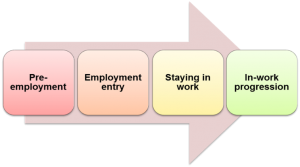Helping achieve sustained employment outcomes through in-work support
Employment support programmes have traditionally focused on pre-employment and employment entry. Yet connecting people to jobs is not just about job entry: it is also about sustaining employment and, ideally, progressing in work.
For individuals facing particular labour market disadvantage – including those with little or no experience of employment, lacking in confidence and/or dealing with other issues – the transitions between the steps on the ‘employment pathway’ illustrated below can be particularly challenging.
Provision of in-work support is one means of de-risking the transition between employment entry and staying in work. It encompasses:
- Practical measures to assist young people to sustain employment – such as help with transport to work, assistance with organising caring responsibilities, job-relevant training;
- Guidance on work-related matters;
- Supporting with non-work related issues that impinge on their ability to hold down a job from an adviser/mentor on a formal or informal basis; and
- Assistance provided to an employer to support a young person’s job retention.
Evidence from Talent Match (a Big Lottery Fund strategic programme developing holistic approaches to combating worklessness amongst young people facing multiple barriers to securing work) demonstrates how in-work support can play a beneficial role for both young people and employers, as well as contributing at a larger scale to reduced spending on out-of-work benefits and increasing tax revenues.
Our thematic study on in-work support involved case study interviews with young people, employers and key worker/ other staff working in four Talent Match partnership areas. This approach enabled us to provide detailed narratives of specific cases of in-work support ‘in the round’ – including supporting a young person with hidden disabilities in employment, helping a young person lacking key life skills with independent living and employment, and assisting a young person lacking confidence in their current job and with planning their next job move.
The young people who were beneficiaries of in-work support valued:
- Practical support on employment entry and in the initial stages of employment.
- Advice on appropriate workplace behaviour and dealing with work-related issues.
- Managing working relationships.
- Ongoing social and emotional support.
- Support in thinking about the next job.
Based on their experience the key workers/ individuals providing in-work support emphasised that:
- In-work support – for young people and employers – needs to be tailored to particular cases – and so may vary markedly.
- It is important for a key worker to provide a ‘sounding board’ for a young person’s work and non-work concerns when in employment, but to re-iterate the (reasonable) expectations of the employer.
- In some instances it is keeping open the channel of communication with the employer (and the young person) that matters, rather than necessarily the communication itself.
- It is important to advise the young person about courses of action to take in particular circumstances rather than taking action on their behalf.
Employers particularly valued a ‘go to’ person with whom they could discuss specific issues as they arose. This communication channel meant they were ‘not on their own’.
The study reiterates the value in viewing in-work support as an integrated element in a package of assistance from pre-employment and employment entry through help with sustaining employment to employment progression. Preventative measures can be taken before job entry (such as reasonable workplace adjustments) to anticipate common problems likely to arise.
But in-work support goes further. It can embrace reactive troubleshooting when challenges occur in employment and providing a ‘sounding board’ for young people and employers. It can assist young people on their employment path and researching and applying for relevant next opportunities.
Anne Green, City-REDI, University of Birmingham https://www.birmingham.ac.uk/staff/profiles/business/green-anne.aspx), working with Sally-Anne Barnes, Institute for Employment Research, University of Warwick (https://warwick.ac.uk/fac/soc/ier/people/sabarnes/), Tony Gore (https://www.shu.ac.uk/about-us/our-people/staff-profiles/tony-gore) and Chris Damm, CRESR, Sheffield Hallam University (https://www.shu.ac.uk/about-us/our-people/staff-profiles/christopher-damm).
